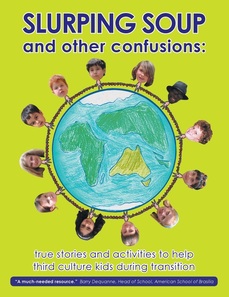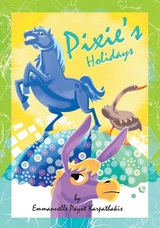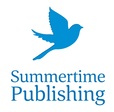Jo Parfitt talks to the authors of Slurping Soup and Other Confusions – a TCK activity book15/3/2013
JP: Tell us about your book. What is it about? Can you describe it in just a few sentences?
SS: Slurping Soup and Other Confusions is a collection of 23 real-life stories created around our own children’s experiences. Each story is followed by related activities in order to actively engage the third culture kid reading the book. We hope the reading and interaction will allow TCKs and their parents the opportunity to begin dealing with their own issues from transitions. The book is for children aged three to 12 and the activities (e.g. brainstorming, feeling finder, ‘weirdometer’) were designed keeping the age group in mind. JP: Why did you write it? SS: The six of us used to meet regularly as follow up to our taking a Parent Effectiveness Training course in 2008, and we would discuss the challenges our kids faced. By the third meeting we realized that many of their challenges were stemming from their experiences as third culture kids. We’re all book lovers and we looked for books that may help. When we couldn’t find such a book someone said: “Wouldn’t it be great if we wrote one?” And that’s how it began. JP: Why do you think your book needed to be written? SS: Many experiences of our 12 children revealed common themes continually faced by expatriate families. We could not find a book that addressed younger children directly. Now a book provides solace in so many ways. By reading of others who have also faced the same problems, a TCK will feel less alone to begin with. The stories and activities inspire discussions among parents and children. Additionally, as so many of us know, writing about our experiences is an extremely helpful exercise. Over time, through the activities children record their memorable experiences; work out their fears or negative emotions; also hopefully figure out solutions. The book eventually becomes a journal for the child. We’ve seen the book being used in this way by own children, who with every move are enjoying scribbling their thoughts into the pages. Jasmine Keel, a consultant and a mother of three TCKs said: “My nine-year-old daughter kept asking me to sit with her and go through some of the stories and activities and was reassured to see her challenges had been shared by other children.” JP: Who do you think will read your book? Or who would you like to read your book? SS: Slurping Soup and Other Confusions is a perfect story and workbook for expat and third culture kids from three to 12 years old; and for the adults that are helping them through those transitions. Our book has been bought and enjoyed by parents, children, teachers and schools alike. JP: What steps have you taken or do you plan to take to promote your book? Which methods have been successful? SS: We’ve used our networks in marketing our books. We’ve held events and talks at various schools and organisations. We plan to work on our blog and collaborate on social media to promote the book. Work is also underway on releasing an e-book version of Slurping Soup and Other confusions. We plan to promote the second edition of Slurping Soup globally now that the six of us are all in different countries i.e. Australia, Brazil, US East and West Coast, as well as China. So many more people to share our book with! We couldn’t have made it thus far without the generous help of a multitude of expatriates. And we look forward to meeting and collaborating with more fellow ‘nomads’ to promote our book further. JP: How did you choose your publisher and publishing method? Why did you decide to go down this route? SS: We initially self published and marketed the book through our own networks with a limited first edition. The amazingly encouraging feedback to the book has been an affirmation for our efforts. It has been called: “…nothing short of a miracle” by parents of children dealing with moves. Then late in 2012, Ulrike Gemmer met Tina Quick of International Family Transitions, who put us in touch with Jo Parfitt of Summertime Publishing. We had already heard of Jo as an esteemed publisher of books for expats and we were delighted when she loved our book! Jo is now publishing the second edition and we’re excited about finding a wider audience through Expat Bookshop. JP: What was your biggest challenge regarding the writing of your book? How have you overcome that? SS: Finding mutually agreeable times to suit six co-authors during our two years of working on the book. Many cups of tea and lots of delicious snacks helped make our meetings fun and delicious! We have really missed meeting face to face ever since four of our co-authors have moved from Beijing. Another challenge is to keep momentum going. We’ve been very lucky that our team works well with each other and we all bring something to the group. For instance, Kathryn Tonges kept us coordinated and motivated throughout, while also spearheading the promotional effort. Ulrike helped promote the book in Beijing and is working on getting the second edition off to the presses; Cherie is similarly currently taking the lead in working on the e-book. The great thing about a team like ours is that at different stages, someone was always ready to take responsibility and run with the ball. Barbara was focal in organizing the essential graphic design of the manuscript. Lucinda brought her positive enthusiasm to the creative process and kept us believing in the book. Maryam kept contributing via Skype and is now handling our Facebook page. Everyone’s energy kept us going. JP: Now you have written this book, what has writing it done for you, your family, your self-esteem or your business? SS: We worked together on all stories and activities for nearly two years and the result was cathartic for all of us – this resource brought us together, deepened our friendships, helped us work out our own challenges and above all was lots of fun. Our children were delighted to share their personal stories and contributed with artwork, pictures, ideas for activities. We have now been rewarded with wonderful feedback from families who have shared the benefits of Slurping Soup for their children’s and families’ transition. On our journey, we’ve connected with so many other proactive expats, who have inspired and motivated us. Best of all, there’s still so much more to learn and connect to. JP: If you were to give advice to someone else who is thinking about writing a book, what would be your number one tip? SS: There are two that worked for us:
For more info on Slurping Soup and Other Confusions, see: slurpingsoup.com facebook.com/slurpingsoup I first met Elka Ray via Twitter I think and since then we have conducted a radio interview, I have read and reviewed her expat novel, Hanoi Jane and soon plan to read her two expat kids’s books as well. She is an inspiring role model for any expat who wants to really make a living as a writer. If you want to find out how to do it too, read on. 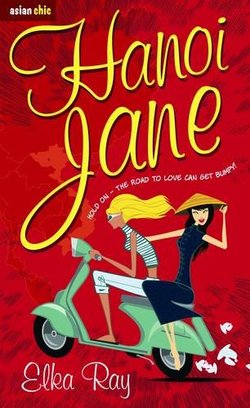 Tell me about your book. What is it about? Can you describe it in just a few sentences? After moving to Hanoi with her fiancé, the book’s main character, a young American reporter named Jane, is dumped for another woman. What starts as a desperate bid to discredit her romantic rival and win back her fiancé ends up with Jane embarking on a wild adventure in the mountains of northern Vietnam. By the end, as well as getting revenge, she’s learned to appreciate her life in Hanoi and has found real happiness. Why did you write it? I’d spent years writing a serious novel, which various editors claimed to love, yet ultimately rejected as “too complicated”. To cheer myself up, and because I had a newborn and lacked the energy for serious thinking, I wrote “Hanoi Jane” to amuse myself. My “ah-ha moment” came in a room full of smart, successful professional women. When I outlined the plot of my serious novel they all listened politely. And then I quietly admitted that I was writing chick lit and they all lit up and started begging to read it. So it turned out that I wasn’t the only one looking for light entertainment. What qualifies you to write this book? Having lived in Vietnam for 16 years, nine of them in Hanoi, I probably know Hanoi better than I know any other place on earth. I also remember what it’s like to be a young, single woman living far from home. While the plot and all of the characters are made up, I think that many of the emotions that Jane feels – loneliness, a sense of alienation, uncertainty – will be familiar to expats, and to everyone who’s ever felt out of place. Who do you think will read your book? “Hanoi Jane” was published as part of Marshall Cavendish’s “Asian chic” series, which clearly targets young women. While I expect that most of the readers are women, I’ve gotten some emails from guys who claim to have enjoyed it too. Bless them! I think that the book makes good holiday reading for anyone with an interest in Asia or a love of travel. It does not matter how good a book is, or how good your writing is if no one knows about it. What steps have you taken or do you plan to take to promote your book? I’ve been profiled in some local magazines and on expat websites, which is lucky. I have an author’s site and blog at elkaray.com, and readers can sign up to receive emailed blog updates. Facebook is handy too. How did you publish your book? Did you find an agent, a publisher or did you publish it yourself? I have an agent, who handled my first (unsold) novel. She deals in literary fiction and had no enthusiasm for “Hanoi Jane”, which is classed as commercial fiction. I sent a query to Marshall Cavendish and was surprised when they took it. For years, I’d thought that it was impossible to publish any fiction without an agent, but obviously that’s not true. That being said, since I write in different genres, I am glad to have an agent, since I’d rather focus on writing than sending out queries. Please describe your process and tell us how you found the experience. Is there anything you would definitely do again or never do again? I think that there’s still some stigma attached to being a self-published author. But while being published by a traditional publisher might be good for one’s reputation and self-esteem, I’m not sure that it’s always the best option financially. If a publisher is willing to give you a big advance and commit a large marketing budget to your book, go with them. But if you’re going to have to do all of the marketing yourself – and share the profits – self-publishing might work out better for you. What was your biggest challenge regarding the writing of your book? How have you overcome that? “Hanoi Jane” pretty much wrote itself, in less than six months, during which I also had a new baby and a half-time job as an editor. But that being said, I’ve been writing fiction since I left university, where I studied Journalism and Asian Studies. Writing this book was easy because I’d made such a mess of my first one. I started that one with no plot and it just grew and grew to include about ten different books. One day I will pull them apart and tug one decent novel out of the crazy tangle. Now you have written this book, what has writing it done for you, your family, your self-esteem or your business? Publishing “Hanoi Jane” boosted my confidence. I’ve gotten great feedback on it, which has encouraged me to keep writing. After 15 years I am finally okay with letting people read what I write. In the past I would have been crushed if someone didn’t like something – now I think: “Fine, they didn’t like that one, but maybe they’ll like this one.” My prose is strong enough that I can write in a range of genres. If you were to give advice to someone else who is thinking about writing a book, what would be your number one tip? If traditional publication is your goal, before you start writing think of the blurb that will go on the book’s back cover. Publishers want a book for which there is a simple answer to the question: “What’s it about?” My four main tips are: 1) Have one strong central character and a single point of view. 2) Know this person and his/her story inside out before you sit down to write. 3) Write the way that you – or your main character – talks. 4) Tell your story as simply as possible.
JP: Tell us about your book. What is it about? Can you describe it in just a few sentences?EPK: Pixie’s Holidays is about old and new friendships. Pixie, who moved from her home (see the first book in the series: Pixie’s New Home), goes back to visit her old house for the first time. Unfortunately she does not recognize the place and her best friend does not know her anymore. Pixie has to find a way to adjust to this and enjoy her holiday.
JP: Why did you write it? EPK: I noticed how difficult it was for my two eldest children to see how their best friends had changed and had new friends. It was a big challenge for them to understand and accept it. JP: Why do you think your book needed to be written? EPK: There is little literature to help expatriate children during a transition and this problem of old versus new friendships is rarely mentioned. JP: Who do you think will read your book? Or who would you like to read your book? EPK: I would like expatriate families to read it, as well as teachers in internationals schools and coaches for expatriates. JP: How did you choose your publisher and publishing method? Why did you decide to go down this route? EPK: Anne Claude Lambelet introduced me to Jo Parfitt of Summertime Publishing. I decided to do this because I don’t know anything about press releases, publicity and distribution. She does everything I cannot do! JP: Now you have written this book, what has writing it done for you, your family, your self-esteem or your business? EPK: My self-esteem is soaring! For my family seems to understand that Mommy is more busy but happier, so they are happier too. My children are proud; it is very cute. They all want to participate and the eldest two give me ideas and even advice sometimes. JP: If you were to give advice to someone else who is thinking about writing a memoir, what would be your number one tip? EPK: Take time to dream, think about it, then write slowly because there are new ideas which come slowly. Take time to correct it and reread it. Share it with close friends and listen to some of their advice. Patience is my word. 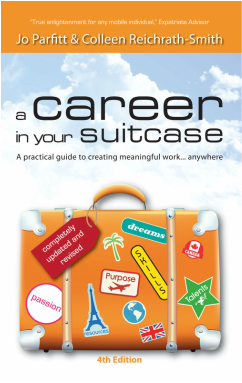 It is hard to believe that 15 years have passed since the first edition of Career in Your Suitcase was published. And way back then one of my top tips for anyone wanting a ‘portable career’ was ‘always have something to hand out’. I still stand by this rule, that if you run your own business, you simply must ensure you always have a business card, postcard, flyer or bookmark on you, so that if you meet someone while you are out and about you can give them something to take away with them in case they want to get in touch. But today, I popped a brand new, fresh off the press, copy of the 4th edition of Career in Your Suitcase in my bag and headed off to Marilyn’s cafe to meet someone I can only think of as The Engineer’s Wife. You see, before I came to Brunei for our mini-posting, I Googled the words Brunei blogger and up popped The Engineer’s Wife, a blog about a Kiwi who was heading for the same town as me. I got in touch, and sorry to say, completely forgot about her! Then, last week she popped a comment on my BrieflyBrunei blog to tell me she was in town, and sitting most days in a cafe with wifi near me. So today, we met and I took along a copy of my book just in case. Well knock me down with a feather, but whaddayaknow – Jenn (The Engineer’s Wife) is a career consultant! Just the person who might like a free copy of the book in exchange for a review! Colleen, my co-author, and I are planning a virtual book tour to celebrate publication next month and are looking for bloggers to write a few words about the book around 19th April in exchange for a free book. So, today, I was able to hand over my first review copy to the perfect blogger – an expat partner and a career consultant! Nothing helps to spread the word about a new book better than a review on-line – on blogs, on-line magazines, on Facebook pages, via Twitter, and of course on Amazon. Sometimes authors are reluctant to give away copies of their precious book when really they would rather exchange them for hard cash. But, I believe that if a review is going to be seen by at least one other potential purchaser, then it is always worth handing over a book. Of course, with the high cost of postage not everyone can be given a real book, like Jenn, but Colleen and I are armed with proof PDF copies (that means they are lower resolution and have a little PROOF watermark on the pages) and Kindle and Epub versions that we are more than happy to give away to anyone who promises to write about our book online. Jo Parfitt talks to Lindsay de Feliz about her terrifying new memoir, What About Your Saucepans?11/3/2013
JP: Tell us about your book. What is it about? Can you describe it in just a few sentences?
LDF: The book is about the last 10 years of my life as an expat in the Dominican Republic. It begins with the heady days of the excitement of living in a new country, falling in love, and then everything takes a turn for the worse. JP: Why did you write it? LDF: I wrote the chapter about being shot first, not as a book but as an article for magazines. Then I decided to write the rest. JP: Why do you think your book needed to be written? LDF: Because people need to know the truth about living here – both good and bad. Many expats live in a bubble, and whilst there is nothing wrong with that, it is good to understand what is really going on. JP: Who do you think will read your book? Or who would you like to read your book? LDF: Firstly people who are interested in the Dominican Republic, those expats who live here, people who come here on holiday, Dominicans who live here and abroad, expats everywhere, and although it is a memoir, also people who like adventure stories. JP: What steps have you taken or do you plan to take to promote your book? (For example: Are you a speaker or trainer? Do you have a blog? A website? A newsletter? Do you use Facebook, Twitter or other social media tools? What about press releases and sending out review copies and free articles? Have you had any other ideas?) Which methods do you think work best and can you give me any examples? LDF: I used to be a speaker but now am unable to speak to groups of people as my voice was affected after being shot. I have a blog, I use Facebook and Twitter, the book has a Facebook page, I am a member of Dominican Republic related FB groups. I am a member and write for several expat forums. I have a PR agency in the UK working for me too. JP: How did you choose your publisher and publishing method? Why did you decide to go down this route? LDF: I knew about Jo as she had published books for friends of mine, Ginnie and Ilana. She knew the expat market, and was prepared to take the book on. JP: What was your biggest challenge regarding the writing of your book? How have you overcome that? LDF: Turning it from narrative into a proper book. Writing dialogue was hard and working out what to leave out.I worked with a fabulous editor and she, along with Jo gave me excellent direction. JP: Now you have written this book, what has writing it done for you, your family, your self-esteem or your business? LDF: I had no idea I could write before, so it has certainly helped my self esteem. As I was waiting for the book to be published and during all of the rewriting phases I started the blog which has given me a great audience and made me lots of new friends. JP: If you were to give advice to someone else who is thinking about writing a memoir, what would be your number one tip? LDF: Start writing. Don’t worry about starting at the beginning, and always stop writing at a point where you know what you want to write about next. Never stop when you are stuck or it is very hard to go back to. JP: Please can you add links here to your website, blog, facebook page, Twitter account and any other social media you have in place LDF: Sure, here they are below: yoursaucepans.blogspot.com @lindsaydefeliz facebook.com/WhatAboutYourSaucepans |
�
All the latest news from the team at Summertime Publishing
As an Amazon Associate, we may earn a commission from qualifying purchases. This does not affect the price you pay or your consumer rights.
Archives
June 2024
|

